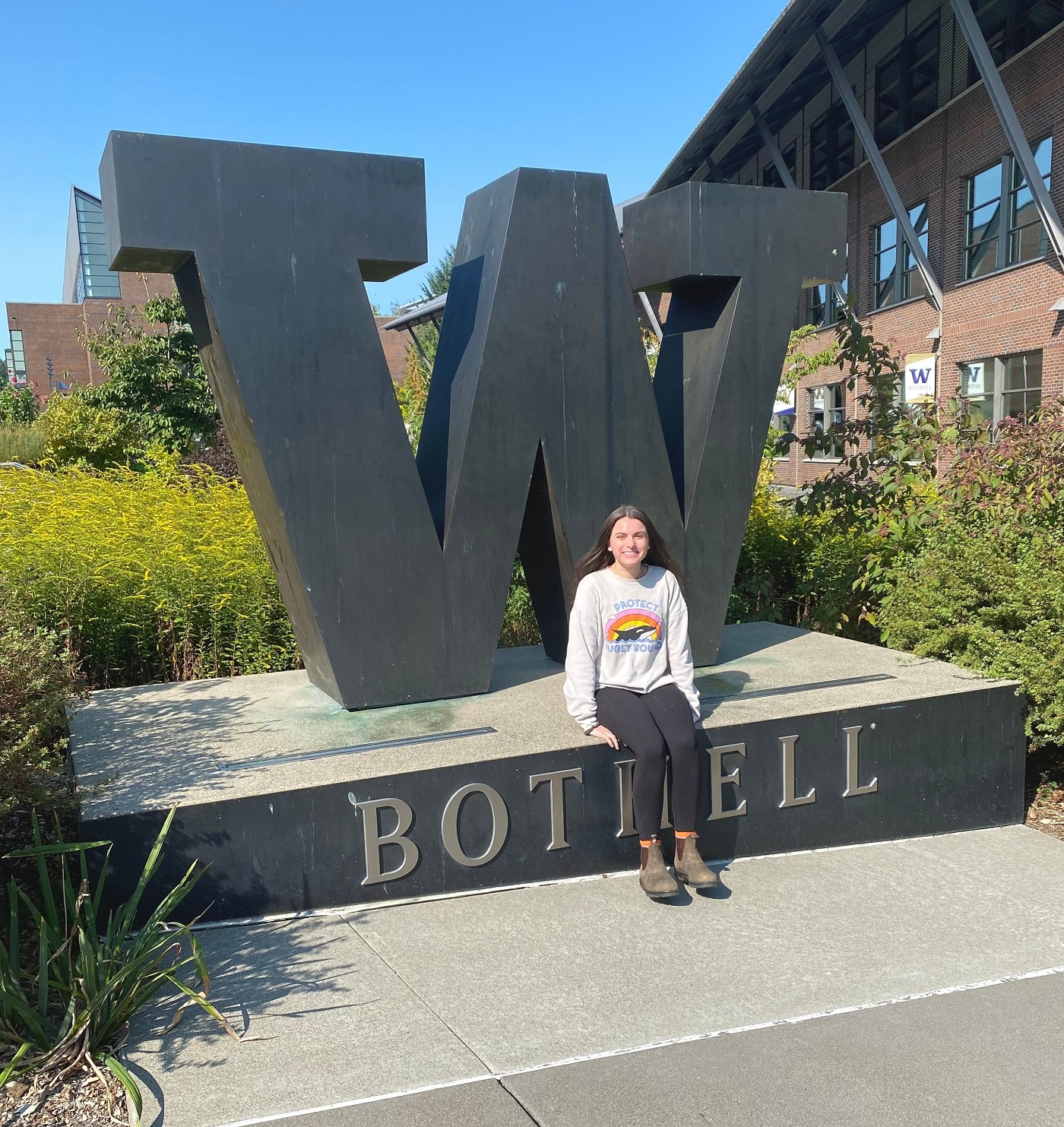Get to Know Sydney Pope, MS CH & SJ Student

Master of Science in Community Health & Social Justice (MS CH&SJ) student Sydney Pope graciously allowed NHS to ask them a few interview questions. Thank you to Sydney for telling us about why they chose this program and about the Fellowship for which they were recently selected.
Please tell us about yourself and what led you to UW Bothell and to our program.
I chose the Community Health and Social Justice program at UW Bothell because the entire curriculum is taught through an equity lens. Rather than having one or two courses about social justice principles, we are taught to focus on inequities in every aspect of community health.
Please tell us about the Fellowship, how you were selected, and how it will impact you.
The Population Health Applied Research Fellowship examines how economic growth and migration impacts communities in King County. This year’s project will focus on business data, particularly the migration of small businesses out of communities due to rising rent prices and other factors. We will be working closely with the King County Demographer and Public Health – Seattle & King County to provide insight that will help inform programming and resource allocation to effectively support communities. I am serving as the social equity lead and the final report lead for this year’s project. This fellowship will give me a more detailed understanding of gentrification in King County, and it will provide me with quantitative research and data analysis skills that I can utilize in my future research.
How did your experience in your coursework help you find your career path or your area of focus?
Our professors have done a great job of exposing us to materials covering a variety of important social issues while also letting us explore our own passions. I have been able to research topics I am passionate about like reproductive justice, child welfare, and the health of incarcerated people while also learning about topics I was less familiar with like environmental racism and debt relief. Our Health Communication and Health Policy, Systems, and Advocacy classes involved working with a community partner to advocate for public health related bills during the legislative session. That experience showed me how much I enjoy legislative advocacy and policymaking and how I could utilize my writing skills to influence policy. Learning about mutual aid networks and inside/outside advocacy strategies has influenced my professional goals and opened my eyes to new possibilities for making lasting change.
Please tell us about a moment at UW Bothell that you are proud of, what you’ve carried over from your education, or what has fueled your passion.
I am proud of advocating for myself and others. As the very first cohort, I think it’s important that we do what we can to ensure the program is the best it can be for future students by providing feedback. After we expressed interest in diving deeper into certain issues, Dr. Chris Wade helped my classmates and I organize a discussion group so we could learn more about topics we were interested in while also getting to know one another better. He volunteered his time to facilitate a discussion group two hours a week during winter quarter in which we explored topics such as critical race theory, mass incarceration, Indigenous healthcare, Palestine, and mutual aid.
Was there a faculty, staff, or student service that had a positive impact on your success?
My faculty mentor, Dr. Nora Kenworthy, has been enormously helpful in providing guidance that has been pivotal to my success. I was not going to apply for this fellowship because I didn’t think I was qualified, but Dr. Kenworthy convinced me that I was and supported me through the application process.
Dr. Jody Early takes time to identify strengths in all of her students, and she goes out of her way to encourage us to develop our talents and passions. She has always been very supportive of my writing and has encouraged me to get out of my comfort zone and share my work outside of class.
Dr. Chris Wade has been dedicated to the success of our cohort from day one. He has volunteered countless hours of his time to facilitate community building and gather our feedback to continue to improve the program.
Dr. Miryha Runnerstrom is exceptionally engaged with her students and she fosters an open and supportive learning environment, which is crucial in a program that covers a lot of heavy subject matter.
Every one of these faculty members has been a hugely important part of my first year in graduate school. Their passion and commitment to the program and their students is what makes the program great.
How do you spend your time outside of work/school?
In my free time, I love to read and watch movies. My partner and I rent movies from Scarecrow Video almost every week. I also love getting outside and taking walks in Discovery Park.
What else would you like readers to know about you?
I am also working on a research project with Washington Prison History Project, an initiative that aims to provide a detailed account of mass incarceration in Washington primarily through the testimony of formerly and currently incarcerated individuals. The open-access archive is part of UW Bothell Library’s digital collections. This summer I am working on a timeline of COVID-19 policies and outbreaks in Washington prisons throughout the pandemic. I will also have the privilege of collecting firsthand accounts from those incarcerated in the early years of the pandemic. I was connected with WPHP through Dr. Kenworthy when she suggested I reach out to Dr. Dan Berger because of my interest in abolitionist ideology. My work with WPHP is another example of an incredible opportunity I never would have had without the guidance of faculty who genuinely care about their students.
